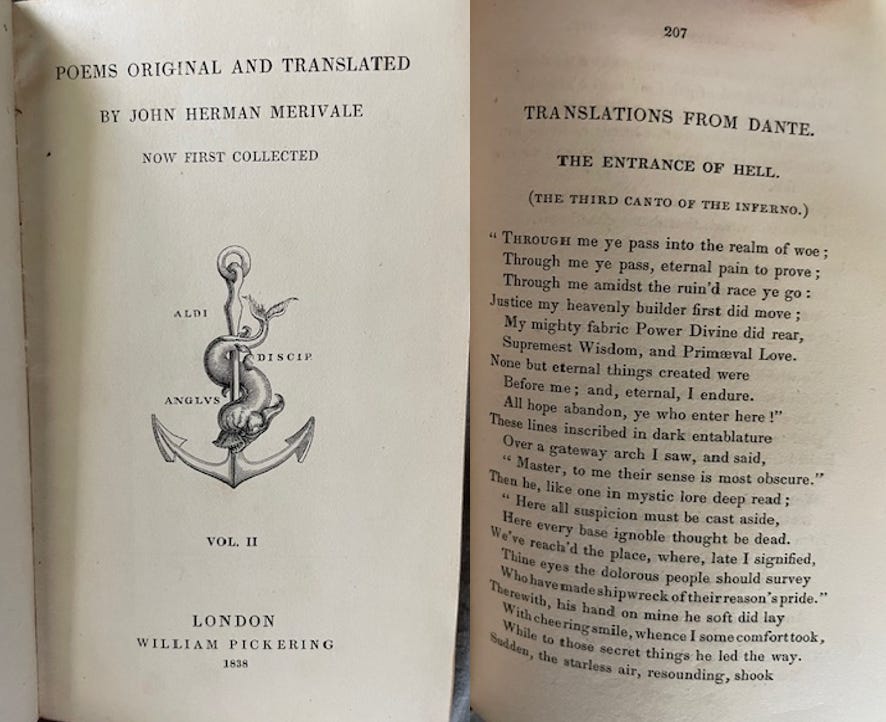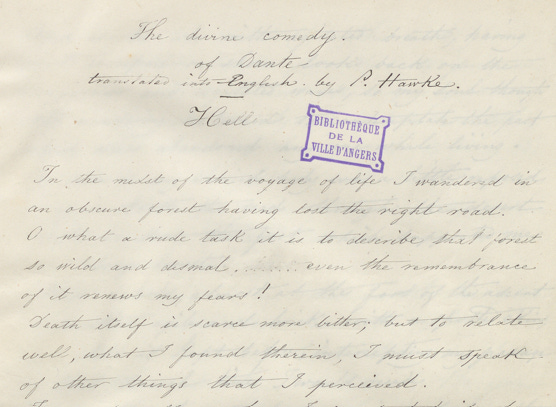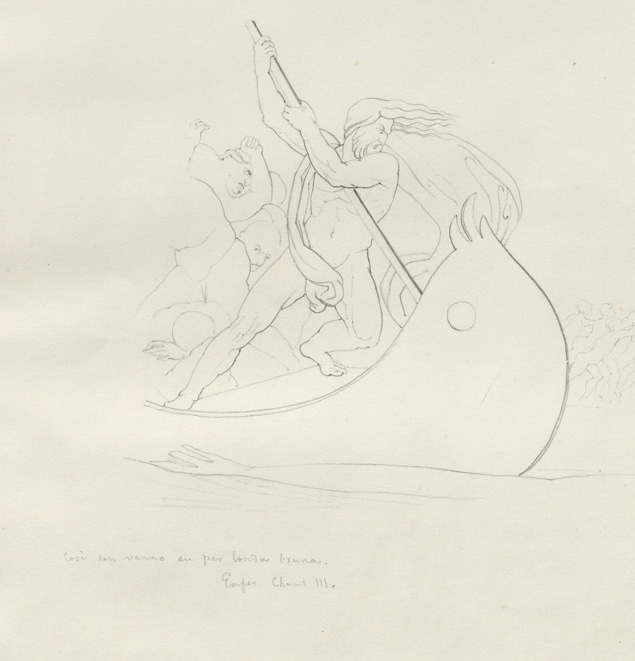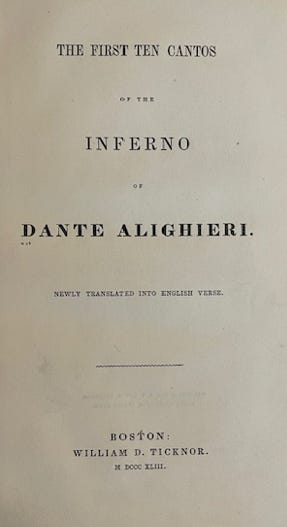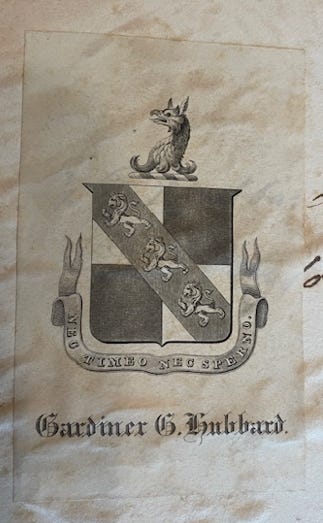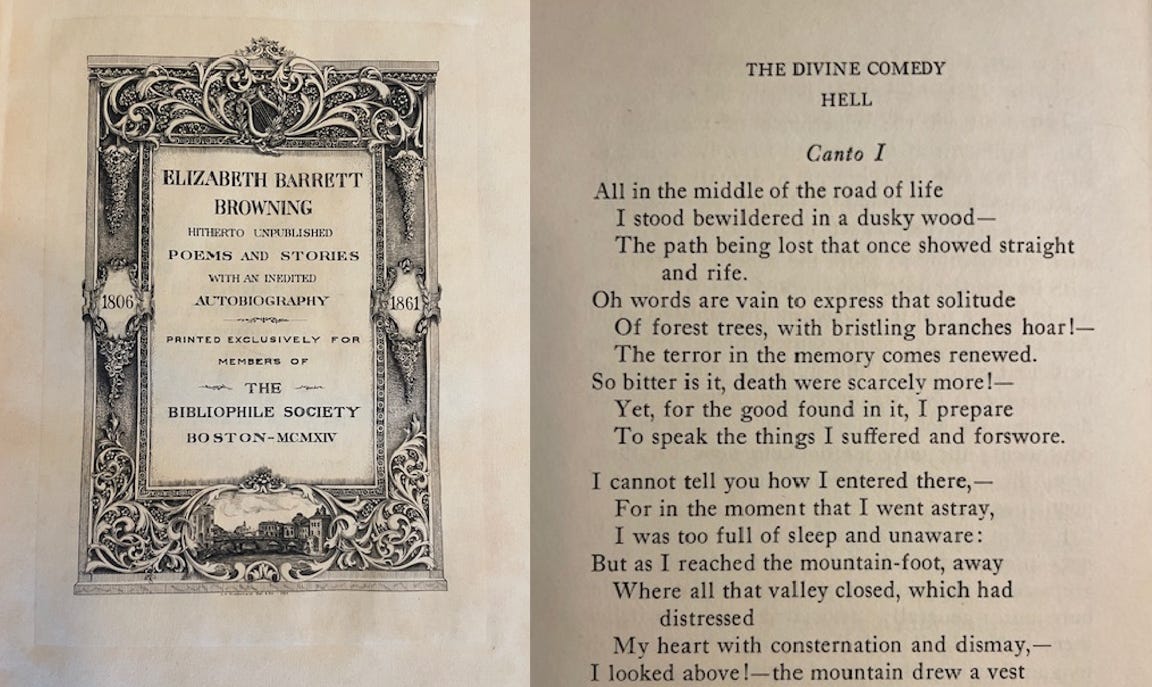Partial translations of at least one canto, Part 2
Here are the remaining partial translations of at least one canto. Again, I was hoping to do all 12 translations in one post, but I started getting the “running out of space” warning, so I split the list in half. This is the second half and will cover Merivale, 1838, through Nind, 1846.
As said in the previous post, this list does not contain the many, many partial translations of less than a canto, and does not include the many prose paraphrases with commentary that, although often containing a complete prose telling, are not intended as translations.
Here are all the partial translations of at least one canto through 1849:
1782 - William Hayley - Inferno - Cantos 1-3*
1804 - Richard Wharton - Inferno - Canto 3
1821 - Anonymous/Humphrey Gubbins [John Payne Collier] - Inferno - Canto 5
1826 (1832) - Anonymous [Jonathan Hatfield] - Inferno - Canto 1
1836 - Anonymous - Inferno - Canto 5
1836 - Odoardo Volpi [Edward N. Shannon] - Inferno - Cantos 1-10
1838 - John Herman Merivale - Inferno - Cantos 3, 10, and 13*
c.1840 - Peter Hawke - Inferno - Cantos 1-17*
1842 - Charles Hindley - Inferno - Cantos 1-4
1843 - Thomas William Parsons - Inferno - Cantos 1-10*
c.1845 (1914) - Elizabeth Barrett Browning - Inferno - Canto 1*
1846 - William Nind - Inferno - Canto 1
Translations in my collection are marked with an asterisk. All pictures are from my collection. All titles are linked to PDF’s where available.
1838 - John Herman Merivale - Inferno - Cantos 3, 10, and 13
John Herman Merivale translated portions of Dante in his Poems: Original and Translated, volume 2,1 published in 1938. In it there are 3 complete cantos from the Inferno: Cantos 3, 10, and 13. Also, there are two near complete cantos, one from the Inferno, Canto 5, line 23 to the end, and the other from Paradiso, Canto 17, line 13 to the end. In addition, there are eight more shorter excerpts representing all three cantiche. There was a second edition in 1844 which was updated with corrections.
c. 1840 - Peter Hawke - Inferno - Cantos 1-17
Peter Hawke was an English born artist who spent his whole adult life in his adopted country of France. Known for his watercolors and engravings, his fame did not really extend beyond France. In the Bibliothèque Ville d'Angers (Library of the city of Angers), France, resides an unpublished manuscript of an English translation in prose of the Inferno, Cantos 1-172, that Hawke undertook sometime around 1840.
Each canto is followed by a drawing representing a scene from the canto.
Quite awesome. I do not own the original, but paid for PDF scans which are in my digital collection of unpublished manuscripts.
1842 - Charles Hindley - Inferno - Cantos 1-4
In 1842, Charles Hindley, published Cantos 1 through 4 from the Inferno in his book In a Plain and Direct Translation of the Inferno.3 Canto 4 is incomplete and stops after line 57. In the Preface he states that his prose translation has “the same breaks and interruptions”4 as in the original, and therefore “each stanza [is] preserved.”5
According to Toynbee6, this was “the first sustained attempt at an English prose translation of any portion of the [Divine Comedy].”7 It wasn’t until seven years later, 1849, when John Carlyle published the first complete prose translation of the Inferno, and in 1852 when Rev. E. (Edmund) O’Donnell published the first prose translation of the Divine Comedy. You can read my post on Carlyle here, and my next post will include O’Donnell.
I have not been able to find out any information on Mr. Hindley. There was a Charles Hindley who was a member of Parliament from 1835 until his death in 1857, which could explain the “Esq.” after the name on the title page, but there is no corroborating information.
This book has eluded me thus far.
1843 - Thomas William Parsons - Inferno - Cantos 1-10
In 1843 Thomas William Parsons published The First Ten Cantos of the Inferno of Dante Alighieri. Newly Translated into English Verse.8 Written in heroic quatrains9, this was his first of an ongoing translation project that spanned decades.
After this he published, in 1865, Seventeen Cantos of the Inferno of Dante Alighieri. He then completed the Inferno and published it in 1867 under the title The First Canticle, Inferno, of the Divine Comedy of Dante Alighieri. This was followed with the first nine Cantos of Purgatorio under the title Ante-Purgatorio of Dante Alighieri in 1875 (1876 in Britain), and in 1893, a year after his death, The Divine Comedy of Dante Alighieri was published, a complete collection of his Dante translations. It contain the Inferno, a bit more than half the Purgatorio, and a few partial excerpts from Paradiso.10
My copy of the 1843 edition has the bookplate of Gardiner G. (Greene) Hubbard. He was the first president of the National Geographic Society and of the Bell Telephone Company!11 That is cool in my book!
c. 1845 (1914) - Elizabeth Barrett Browning - Inferno - Canto 1
Yes, THE Elizabeth Barrett Browning. Who knew? Browning translated Canto 1 of the Inferno, but it was not published until 1914 when all her unpublished poems were gathered and printed for the members of the Bibliophile Society of Boston.
In the late 1800’s, members only bibliographic societies were basically “gentlemen's dining clubs with a library collection, who occasionally also hand-printed their own volumes for their members.”12 It was in 1914 when the Bibliophile Society of Boston printed 453 copies13 of Elizabeth Barrett Browning Hitherto Unpublished Poems and Stories,14 issued in two volumes.
Her unpublished poems and stories were chronologically ordered, so the year 1845 is approximated based on the information in the book. Canto 1 is in volume 2 (p. 238) and translated in terza rima. She attempted a translation of Canto 1 of the Inferno many years earlier, around 1819. It is in volume 1 (p. 133), a blank verse translation of lines 1 to 27. She would have been 13 years old!
1846 - William Nind - Inferno - Canto 1
William Nind was the Vicar of Cherry Hinton and a fellow15 of St Peter’s College in Cambridge. In 1846 he translated, in terza rima, Canto 1 of the Inferno (p. 216) in The Legend of Latimer, A Zurich Tale; With Other Poems.16
I feel like I should write more about Nind, but there is not much else to say except that I have not yet found a copy!
My next post will resume chronologically listing the complete translations and will start with Patrick Bannerman’s Divine Comedy published in 1850.
Merivale, John Herman. Poems: Original and Translated. Vol. 2, London, William Pickering, 1838.
Hawke, Peter. Cantos 1-17. Bibliothèque d’Angers, Angers, France, Accession # DEC-DIG-15296. MS 1355, c. 1840.
Hindley, Charles. In a Plain and Direct Translation of the Inferno. London, Pelham Richardson, 1842.
Ibid, p. iv.
Ibid, p. iv.
Toynbee, Paget. Dante in English Literature, in Two Volumes, Vol. 2. London, Methuen & Co., 1909.
Ibid, pp. 666-667.
Parsons, Thomas William. The First Ten Cantos of the Inferno of Dante Alighieri. Newly translated into English Verse. Boston, William D. Ticknor, 1843.
A heroic quatrain is a stanza of four lines in iambic pentameter with either an alternating rhyme scheme (ABAB) or rhymes in couplets (AABB) . Also known as an elegiac quatrain.
For a complete summarized list of the contents see:
Cunningham, Gilbert F. The Divine Comedy in English, A Critical Bibliography, 1782-1900. Edinburgh and London: Oliver and Boyd, 1965, p. 93.
“Gardiner Greene Hubbard (1822-1897) - American Aristocracy.” Americanaristocracy.com, 2024, americanaristocracy.com/people/gardiner-greene-hubbard. Accessed 6 Dec. 2024.
“Bibliophile Society Annotated Bibliography & Selected Collectible Books. A Rare Atmosphere: The Bibliophile Society.” Artunderwraps.com, 2017, artunderwraps.com/Bibliophile-Society.html. Accessed 7 Dec. 2024.
Ibid.
Browning, Elizabeth Barrett. Hitherto Unpublished Poems and Stories: with an Inedited Autobiography, Vol. 2. Boston, The Bibliophile Society, 1914.
A “fellow of a college” refers to a senior member of the academic staff at a university
Nind, William. The Legend of Latimer, a Zurich Tale; With Other Poems. London, Francis and John Rivington, 1846.




